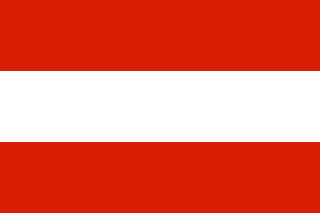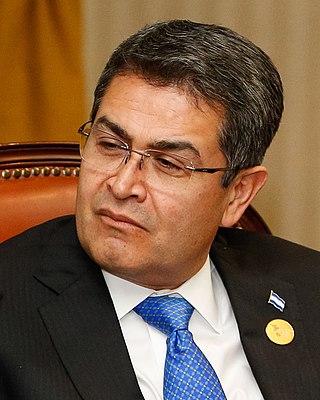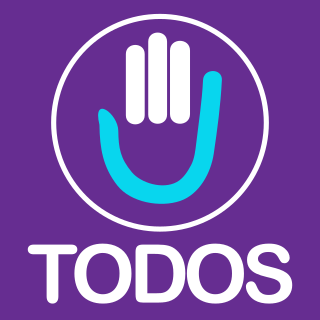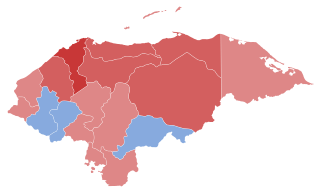
Politics of Honduras takes place in a framework of a multi-party system presidential representative democratic republic. The President of Honduras is both head of state and head of government. Executive power is exercised by the government. Legislative power is vested in the National Congress of Honduras. The party system is dominated by the conservative National Party of Honduras, the Liberal Party of Honduras, and Liberty and Refoundation.

The Liberal Party of Honduras is a centrist liberal political party in Honduras that was founded in 1891. It is the oldest extant political party in the country; further, it is one of the two main parties that have, until recently, dominated Honduran politics. The party is a member of the Liberal International. The PLH is identified with the colours red and white, as the flag Francisco Morazán used in most of his military campaigns during time of the Central American Federal Republic.

The National Congress is the legislative branch of the government of Honduras.

Iris Xiomara Castro Sarmiento, also known as Xiomara Castro de Zelaya, is a Honduran politician and businesswoman who is the 56th president of Honduras, in office since January 2022. She is the country's first female president, having earlier served as first lady during the presidency of her husband Manuel Zelaya.

The National Change Union, sometimes translated as the Union of National Change, was a national liberal political party in Guatemala.

Juan Orlando Hernández Alvarado, also known as JOH, is a Honduran lawyer, politician and convicted drug trafficker who served as President of Honduras from 2014 to 2022 for two consecutive terms.

Liberty and Refoundation is a left-wing political party in Honduras. Libre was founded in 2011 by the National Popular Resistance Front (FNRP), a leftist coalition of organizations opposed to the 2009 coup.
List of events in the year 2012 in Honduras.
Margarita Dabdoub Sikaffi is a Honduran politician. She is commonly known as Margie Dip. Dabdoub was the first female mayor of La Ceiba. She served as mayor of La Ceiba 1994–1998. Prior to entering electoral politics, Dabdoub worked as spokesperson for the Standard Fruit Company. She was named as governor of the Atlantida department by president Manuel Zelaya. Following the 2009 Honduran coup d'etat, that ousted Zelaya, Dabdoub declared that she had not been a 'cuartista' but opposed the coup.

Salvador Alejandro César Nasralla Salum is a Honduran sports journalist, television presenter, businessman, and politician who has served as the First Vice President of Honduras since 27 January 2022.

Todos is a political party in Guatemala.

General elections were held in Costa Rica in 2018 to elect both the President and Legislative Assembly. The first round of the presidential election was held on 4 February 2018, with the two highest-ranked candidates being Christian singer and Congressman Fabricio Alvarado Muñoz from the conservative National Restoration Party and writer and former Minister Carlos Alvarado Quesada from the progressive Citizens' Action Party, gaining 24% and 21% of the votes respectively. As no candidate received more than 40% of the first round vote, a second round run-off election was held on 1 April 2018 and was won by Carlos Alvarado Quesada, with a landslide victory of 60.6% of the vote.

General elections were held in Honduras on 26 November 2017. Voters went to the polls to elect the President of Honduras to serve a four-year term, as well as 128 members of the unicameral National Congress, 20 members for the Central American Parliament and mayors for the municipalities of Honduras.

The 2017–18 Honduran protests were occurring throughout the country since the 2017 general election.
Same-sex unions are currently not recognized in Honduras. Since 2005, the Constitution of Honduras has explicitly banned same-sex marriage. In January 2022, the Supreme Court dismissed a challenge to this ban, but a request for the Inter-American Commission on Human Rights to review whether the ban violates the American Convention on Human Rights is pending. A same-sex marriage bill was introduced to Congress in May 2022.

General elections were held in Guatemala on 25 June 2023 to elect the president and vice president, all 160 seats in Congress, all 20 members of the Central American Parliament, and mayors and councils for all the country's 340 municipalities. Incumbent president Alejandro Giammattei was constitutionally prohibited from running for a second four-year term. However, as no presidential candidate obtained over 50 percent of the vote in the first round on 25 June 2023, a second round was held between the top two finishers on 20 August 2023: Congressman Bernardo Arévalo of the Movimiento Semilla and Sandra Torres, a former first lady representing the National Unity of Hope (UNE) party. Arévalo defeated Torres in the second round with nearly 61 percent of the vote in what was seen as a landslide. The ruling Vamos party won the largest number of seats in Congress.

The Savior Party of Honduras, sometimes translated as the Savior of Honduras Party, is a populist political party in Honduras founded in 2020 by Salvador Nasralla, founder and member of the Anti-Corruption Party until 2017.

General elections were held in Honduras on 28 November 2021. Among the positions being contested was the President of Honduras, head of state and head of government of Honduras, to replace Juan Orlando Hernández from the National Party. Also up for election were the 128 deputies of the National Congress, 20 deputies to the Central American Parliament, 298 mayors and 298 vice mayors, as well as 2,092 council members.

General elections were held in El Salvador on 4 February 2024 to elect the president, vice president and all 60 deputies of the Legislative Assembly. This was followed by a second set of elections on 3 March 2024 in which voters elected all 44 mayors and municipal councils of the country's municipalities and all 20 of El Salvador's deputies to the Central American Parliament (PARLACEN).

Luis Rolando Redondo Guifarro is a Honduran politician and engineer, serving as deputy and current disputed president of the National Congress of Honduras since 25 January 2022.

























